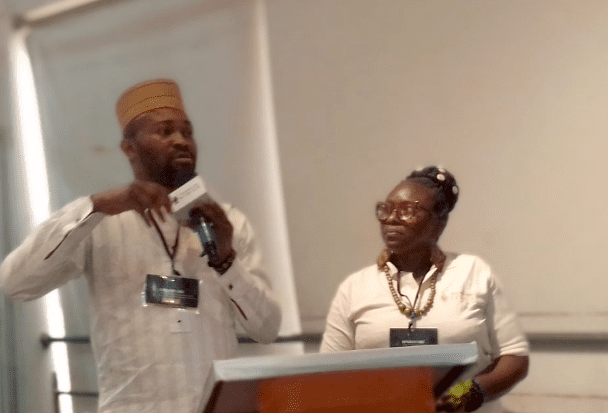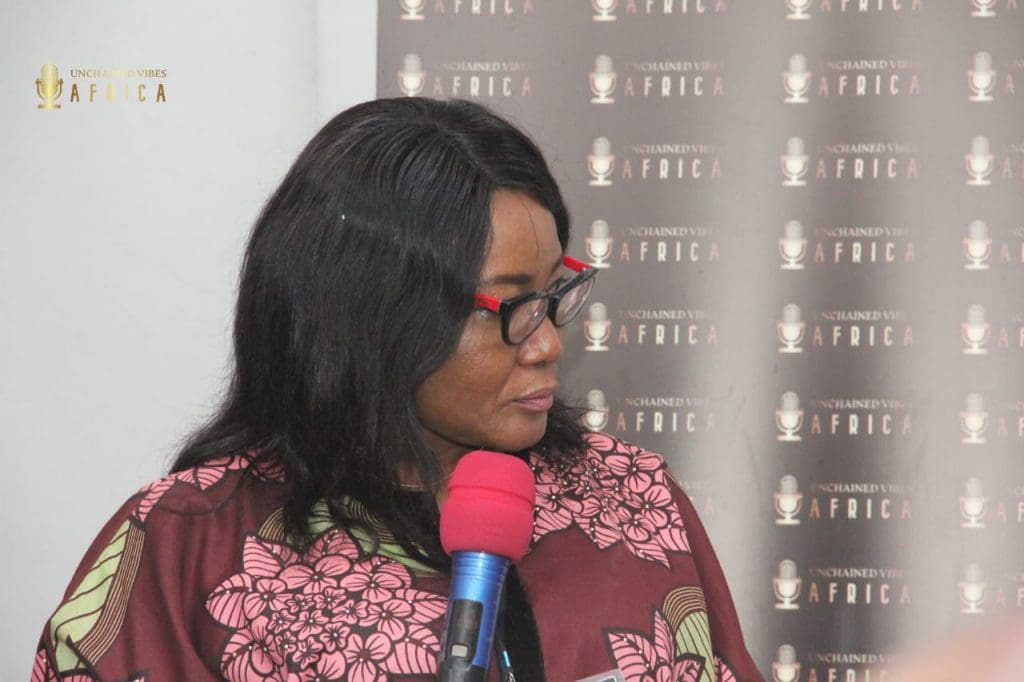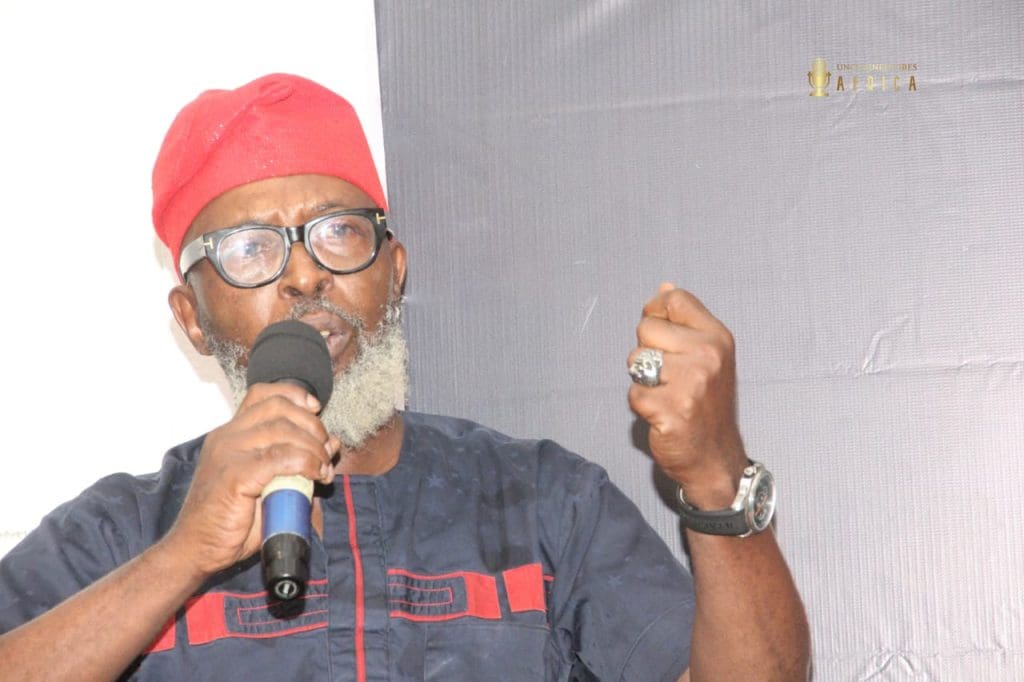*Corporate Nigeria promoting indecency content through sponsorship
*Musicians need good education
*DJs need to see beyond money, women’s private parts to promote good music
By Ozoro Opute
HOW can a parent watch a musical video or listen to music with his 10 or 12 years’ old without feeling queasy in his or her guts at the sheer nudity and vulgarity on display? That is how best to describe what is on offer in the name of music and musical videos that pepper airwaves in Nigeria. So what happened to the gatekeepers in the TV and radio stations and government’s regulatory agency, the National Broadcasting Commission (NCC)? Have they all gone to sleep and allowed cancerous audio-visual content to fester unchecked?

That was the sense one got last week when Unchained Vibes Africa (UVA) held its April edition of Democracy Vibes summit at Freedom Park, Lagos, that ended with poetry performance at the same venue. The organisers assembled a panel of resource persons in relevant fields to speak on ‘Regulation of Musical Works on radio and TV: Matters Arising.’ They included three artists – Irawo Drumline, Myke Pam and Eedris Abdulkareem, a radio DJ, Mr. Raymond Bola-Browne, an art journalist and writer, Mr. Anote Ajeluorou, with moderation from a ace radio broadcaster, Funke Treasure-Durodola.
The audience, largely made up of young undergrads, responded with gusto and sang to Treasure-Durodola’s prompting, as she reeled out musical tracks that fall fowl of the ‘Not-to-Be-Broadcast’ content code and other radio and TV’s golden don’t codes that all seemed to have been flung out the window by today’s seemingly ‘anything-goes’ standards or lack of standards thereof.
Bola-Browne traced the rut to over-commercialisation of airwaves by DJs, who insist that artists must pay them money before their music can be aired. The feeling among today’s Djs is that once artists ‘blow’, euphemism for making it big as artists, they hardly come back to appreciate the work DJs do to lift them to their high pedestals. According to Bola-Browne, today’s overly monetised DJs play any music, so long the artist pays up regardless of the poor standard of the work, least of all the lyrics that could be anything but pleasing or decent.
Bola-Browne also said there’s the general consensus among artists that clean lyrics do not sell any more, a proposition he equally rejected. He gave the instance of Tiwa Savage’s entry into the Nigerian music scene. He said while still in America, Tiwa savage still did clean music, but on getting to Nigeria, she changed gear and switched to lewd lyrics, having been heavily influenced by the indecent language and apparent nudity that she now openly expouses in her lyrics and musical videos. Bola-Browne called for a return to the old, golden ways where Nigerian lyrics and musical videos were decent and wholesome and still carried messages of love, family togetherness, goodness and orderly society. Bola-Browne said the claim by artists that clean music does not sell is a myth, saying that Tuface Idibia has been on the music scene for some 20 years and does not sing obscenity or nudity in his music videos. He tasked young musicians to look inward and produce music that is wholesome for the entire family.



Also, corporate sponsors are believed to be at the root of the negativity that’s at work in Nigerian music. Bola-Browne said companies prefer to sponsor programmes and projects that have negative or obscene content and leave out ones with decent content. He wondered why these companies pander to immoral shows at the expense of good ones. He said big corporate sponsors usually jostle to be lead sponsor of the indecent show Big Brother Naija (BBN), an indication that these companies favour indecency and improper conduct.
Female drummer, Oluwakemi Famugbode (aka Irawo Drummer), painted a grim, pathetic picture of what young female artists go through in the hands of DJs in their bid to promote their music on air in radio and TV stations. While money may also be part of the bargain, she said sex was the uppermost thing in the minds of most DJs, who believe that without offering them sex a female artist stood no chance of getting her music promoted.
“Once you take your music to them, what they first see in you is your breasts and vagina,” Famugbode said. “And once your vagina and breasts are not available for them to do with as they like, they won’t even look at your music twice. I’ve suffered sexual harassment so much that I have almost given up trying to promote my music on air. A music promoter once told me, without even seeing my music, that we need to ‘collaborate’ in all areas, so he can fully promote me to as high as can be.”
The female drummer said she would not demean herself to that level even if that was the only way to make it in music. Famugbode sued for a change in the rules of the game, so female musicians could find space to showcase their talents devoid of sexual harassment prevalent in the industry. She said the attitude of DJs to female musicians is capable of driving away female artists to the point of abandoning their music talent entirely.
For Ajeluorou, a lack of proper education, the sort majority of Nigerian writers have, is to blame for the poor lyrical content that morphs into obscenities and lewdness that characterise most music and musical videos on offer. He advised musicians to be educated, that way, he said their works would approximate those of writers whose sensibilities to acceptable social norms will not allow them write obscene books that cast the country in bad light. He also said some of the music like Abdulkareem’s ‘Nigeria Jagajaga’ made some 20 years ago was borne out of Nigeria’s worsening, irredeemable politics that has failed to lift the country to the enviable heights it is supposed to be. The continuing slide into anomie, Ajeluorou pointed out, was bound to inflame artists of all hues to want to haul missiles at the polity and its operators who are hell bent on the path of ruining the country further.
He said as an art journalist and critic, he stopped writing about Nigerian music, as it has since lost its lustre and meaning. Ajeluorou said he did not see anything to write about the meaningless music on offer, and has since turned his attention to writing about books and other forms of serious art. He, however, conceded that he sometimes visited MUSON Centre to listen to classical music, as perhaps the only untainted music in the country.
Reggae master, Pam, said Nigerian music was becoming irredeemable since young musicians have shunned the wholesome path of reggae music that abhors obscenity for music that lacks direction. He said efforts by the Performing Musicians Association of Nigeria (PMAN) to rein in musical content while he an official of the union met a brickwall, as the musicians confessed to poor patronage. Thus ended PMAN’s efforts to get musicians to do clean music. Pam said there was need for all parties to make concerted efforts to clean up Nigeria’s music for the better.
Abdulkareem said he’s an advocate of good music that has socially relevant content, saying he loves carrying other people’s problems on his shoulders. The ‘Mr. Lecturer’ crooner also narrated how he came about the song years ago. According to Abdulkareem, he and his crew ran into the agitated young girl on the street, and sought to know what was wrong with her. She confessed to escaping from her lecturer who wanted to sleep with her in a hotel. After calming her down, he explained who he was and asked her to take them to the man’s hotel room, but instructed her not to close the door to the man’s room. He disclosed that he and his crew stormed the hotel room and met the old man of 70 plus naked, and filmed him. They also extracted a promise from him not to molest any girl ever again in written form after he pleaded with them not to expose him.
‘Mr. Lecturer’, Abdulkareem said, was the result of that unsavoury encounter, a solid music track that has survived some 17 years of airplay devoid of lewdness even if the subject is sex. He said the girl in question would eventually graduate and relocate to America from where she sometimes write to thank him for his help. He, however, expressed regret that sexual harassment was yet to stop after his expository music years ago, as lecturers still run riot with their illicit acts that endanger young undergraduate girls.
The ‘Nigeria jagajaga’ crooner, who calls former President Olusegun Obasanjo his father, also recounted his sour experience with American rapper, 50 Cent, when they were billed for a show outside Nigeria. He said he had extracted a firm promise from the sponsors of the show that whatever first class treatment accorded 50 Cent would also be extended to him while signing contract ,and they agreed. So he’d gone inside the plane that would fly them out and sat down in the executive class. But when 50 Cent arrived, he asked him (Abdulkareem) to leave the plane, calling him a nigger. But Abdulkareem calmly told him nigger was an anomaly in Africa, as no one called anyone by that name, and that he was billed for the same show as him, and so was entitled to where he was sitting. The confrontation sparked off a row that became media buzz back then.
He blamed the organisers for privileging a foreigner over him in his own land, and insisted on his right and got it. He said artists needed to know their rights and insist on them otherwise they would be taken for fools.
Although Secretary to the National Broadcasting Commission (NCC), Dr. Igomu Onoja, tasked everyone to work towards better broadcasting environment, he gave his commission pass mark for the work it does. But stakeholders were not convinced about the commission’s work, insisting that there could not have so many indecent musical videos enjoying airplay if the commission was alive to its responsibilities. BBN is one area stakeholders held the commission accountable, arguing that the commission has failed in its oversight and has allowed DSTV to run amok with content that is not-fit-for broadcast, content that compromises the culture of decency in broadcasting.






Comments are closed.